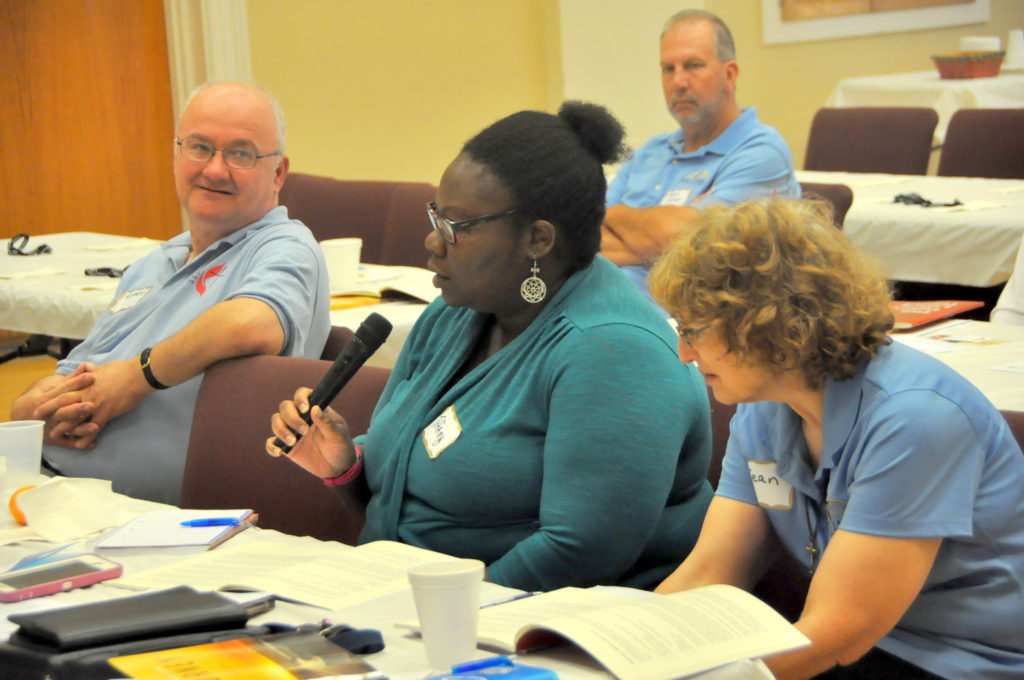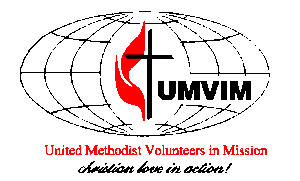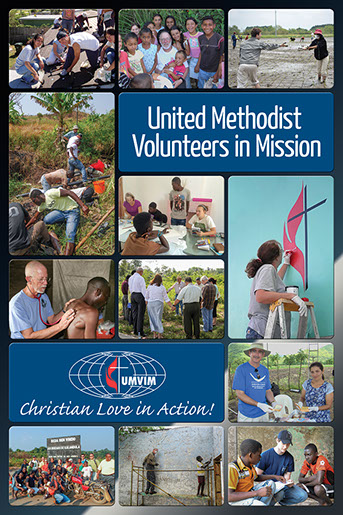
How to Get Your Church Involved
Eastern PA Conference Disaster Response Coordinator Robert Simcox and the Rev. Russell Atkinson, conference UM Volunteers in Mission Coordinator, organized dual, daylong training events July 14 for people who want to become VIM team leaders and Early Response Team members. Some of them hope to use those skills in Puerto Rico and elsewhere.
The conference’s new Disaster Response & UMVIM leadership team—Simcox, Atkinson, Camacho and adviser Ben Botti—all helped lead the joint training events held at West Lawn UMC, along with the Rev. Tom Lank, UMVIM Coordinator for the Northeastern Jurisdiction.
 Another joint VIM and ERT training event is scheduled for Oct.20 at Otterbein UMC in Lancaster. Persons interested in growing and helping others through a potentially life-changing mission encounter are urged to register now via the conference website.
Another joint VIM and ERT training event is scheduled for Oct.20 at Otterbein UMC in Lancaster. Persons interested in growing and helping others through a potentially life-changing mission encounter are urged to register now via the conference website.
Rev. Russell Atkinson wrote the following article to explain the UMVIM process and concerns.
In nearly a year since Hurricane Maria wreaked havoc across much of Puerto Rico, we have watched news reports of the extensive devastation and the long, difficult road to recovery. We have prayed. We have given funds through our districts, the Annual Conference and UMCOR. We have assembled UMCOR cleaning buckets.
Some of us who have lived through storms know the importance of having companions in the journey toward recovery. We want to go help our sisters and brothers in Christ in Puerto Rico.
But how? The answer to that question has much to do with John Wesley’s Three Simple Rules. “Do Good,” but first “Do No Harm.”
Let’s Go! … But Wait . . .
We must ensure that our partners there, the Methodist Church of Puerto Rico (MCPR), remain in charge of their own recovery. UMCOR has consulted with MCPR from the beginning; but it is up to resident Bishop Hector Ortiz and his leaders to develop their own strategy for organizing the recovery effort.
Of vital importance is that we do not become “the disaster after the disaster.” Disaster-affected communities only have so much capacity to receive, house, feed, transport, and supervise volunteers. Furthermore, if our efforts are not conscious of insurance policy stipulations and federal relief protocols, we might ruin our host’s chances of receiving aid to which they are entitled. The last thing we want to do is unwittingly place more of a burden on the community.
United Methodist Volunteers in Mission (UMVIM) teams work within a tried and true design that provides a reliable supply chain for the resources needed in the reconstruction effort. That was difficult for several months due to procurement and distribution concerns immediately following the hurricane. Thankfully, those problems have diminished or been resolved.
Now Let’s Go!
In January 2018, the Methodist Church of Puerto Rico released its guidelines for receiving volunteers. They can be downloaded at http://umvimnej.org/. Some highlights were:
- Teams could be no more than 14 people.
- Team members needed to be at least 18 years old.
- All team members needed to have Safe Sanctuaries certification.
- Duration of the trip should be 7-8 days with no Sunday travel.
- Due to the climate, terrain, conditions and limited access to electricity, team members should be in good physical condition and not reliant on refrigerated medicines or electrical devices like CPAP machines.
- Housing would be bunkhouse-style at churches or Methodist camp & retreat facilities around the island.
- Translators and meals would be provided by the Methodist Church there.
 Initially, trained Early Response Teams were invited with the expectation that regular rebuilding teams would be scheduled later. But the church soon began scheduling VIM teams regardless of ERT training. They have the capacity to host 5-6 teams at a time and are now scheduling teams for this fall into next year.
Initially, trained Early Response Teams were invited with the expectation that regular rebuilding teams would be scheduled later. But the church soon began scheduling VIM teams regardless of ERT training. They have the capacity to host 5-6 teams at a time and are now scheduling teams for this fall into next year.
Remember that recovering from a storm of this magnitude will require volunteers for up to 10 years. As United Methodists, we need to be committed for the long haul. UMCOR and UMVIM are known for remaining to help disaster-affected communities long after other relief organizations have fulfilled their mandates and left.
The Process
Should you or your church be interested in serving in Puerto Rico’s recovery effort, the first step is to contact me. As your conference UMVIM coordinator. Email me at ratkinson@epaumc.org. I can answer your initial questions and get you started.
If you are an individual or do not have enough people to make up a full team, I can connect you with other like-minded people in the conference to combine your efforts. Another helpful contact is the Rev. Nick Camacho, our Conference Puerto Rico Recovery Support Coordinator
Once you fill out an online “Intent to Serve” form our partners in Puerto Rico can assess when and where to deploy you. UMCOR’s U.S.-based scheduler will confirm that you meet the criteria set by the MCPR and help firm up the dates and venue for your service. From that point on, your team will be handled by the amazing team that Bishop Ortiz has assembled in Puerto Rico.
Church-to-Church partnerships
Some of our EPA Conference churches, pastors, and laypeople already have relationships with churches in Puerto Rico. If you plan to arrange your own visit directly with a local church, please make sure you still connect through our system and notify us of your plans and actions. Sidestepping the system that the MCPR has put in place can strain already scarce resources and create unnecessary competition for teams and resources within their church.
Answers to some Frequently Asked Questions:
Do I need a passport?
No. Puerto Rico is a U.S. Territory and its citizens are U.S. citizens. You do not need a passport to visit, and Puerto Ricans do not need a passport to come to the mainland.
How much will it cost?
It depends on the size of your team, but a ballpark figure would be $1000-$1250 per person, assuming a $500 plane ticket.
Can I bring my youth mission team?
Not yet. The current guidelines only allow for team members 18 years and older. As the recovery progresses, this guideline may change.
Do I need specific skills?
All team members are welcome as long as they meet the criteria of the MCPR. However, certain skills are highly valued such as masonry, roofing, electrical, and particularly the ability to work with metal roof trusses.
